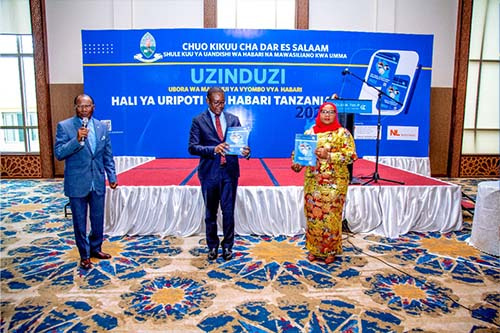UDSM SJMC launches a report on the state of journalism reporting 2022
By Special Correspondent, CMU
The University of Dar es Salaam, through the School of Journalism and Mass Communication (SJMC), has launched a research report on the state of journalism reporting in the country, on 14 December, 2022.
The report, titled “The State of Journalism Reporting in Tanzania 2022”, is published under the banner of the Yearbook on Media Quality in Tanzania Research Project which is being implemented by SJMC, with support from Switzerland and the Netherlands embassies in the country.
The launch of the report, which was held in Zanzibar, was graced by the Deputy Minister of Information, Communication and Information Technology, Kundo Andrea Mathew and Zanzibar’s Minister for Information, Youth, Culture and Sports, Tabia Maulid Mwita.
This event was also attended by editors, representatives from media support organisations, journalism trainers, seasoned journalists and two ambassadors—Didier Chassot (Switzerland) and Wiebe de Boer (Netherlands). The UDSM Vice Chancellor, Prof. William Anangisye and the SJMC Dean, Dr. Mona Mwakalinga, were also in attendance.
The two guests, Deputy Minister Kundo Mathew and Minister Tabia Mwita commended UDSM for the research that details the state of journalism reporting in the country.
“We thank the University of Dar es Salaam (UDSM) for conducting this research. We believe that the findings of this research will be used by media stakeholders, particularly editors, to improve the quality of reporting,” said the Deputy Minister.
On her part, Zanzibar’s Information Minister also commended the University and advised its management to look at the possibility of partnering with the State University of Zanzibar to conduct a similar study for Zanzibar’s media houses.
“I implore upon you (UDSM-SJMC) to explore a partnership with the State University of Zanzibar (SUZA) to research the quality of journalism reporting in Zanzibar by including more media houses and, if possible, online media,” she urged.
Presenting the research findings, the principal investigator, Abdallah Katunzi, noted that the performance of media houses reveals a twofold pattern. On the one hand, there is a significant increase in quality in 2022 relative to the quality performance reported in 2019 and 2020. On the other hand, some areas remain entirely low-key and need drastic changes.
Despite the observed shortcomings, the researcher said that “the country had witnessed a dynamic development in the quality of reportage in both print and electronic media. Paradoxically, some media houses that had trumped others in 2019 ended up in the lower echelons in 2022 regarding media quality ranking”.
Unlike in 2019 and 2020, in which the political environment was primarily blamed for the poor quality of journalism reporting, financial sustainability has now become the primary concern of media houses in the country, which inevitably affects the quality of journalism reporting. The report can be accessed at Year Book Report 2022.
Other News
Sun, 10.Nov.2024 : UDSM na UH vyafanikisha upatikanaji wa Kamusi ya Kihispania-KiswahiliFri, 08.Nov.2024 : UDASA Bonanza 2024 picks up vibes
Fri, 01.Nov.2024 : Robotics Bootcamp attracts hundreds of young talents to UDSM, sparks passion for Physics and Technology
Wed, 30.Oct.2024 : Dr. Jackson Justo drives AI-powered energy innovations for sustainable future
Thu, 24.Oct.2024 : Partnership with NMB promises innovation, talent development and digital transformation at UDSM
Wed, 09.Oct.2024 : Economics don Dr. Innocensia John is named among 2024 top Agri-Food Pioneers
Tue, 08.Oct.2024 : School of Mines and Geosciences gears up for Helium exploration in Tanzania
Sat, 05.Oct.2024 : UDSM students excel in 2024 NGEA Award Regional Challenge


